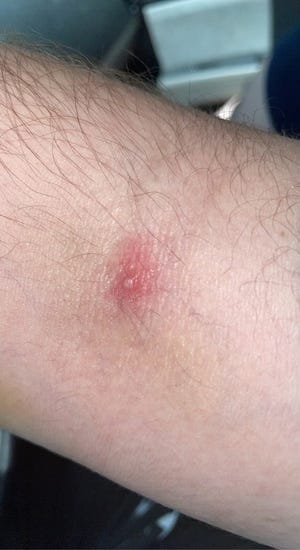Louisville resident shares monkeypox journey to help decrease stigma
[ad_1]
When he developed swollen lymph nodes, chills and nausea on Aug. 16, Luke Morrison thought he had a cold or the flu.
Two days later, he woke up “itching crazy.”
“I look in the mirror,” he said, and “I have a rash over my body.”
He went to the emergency room, where he was tested for monkeypox. Two days after that, the Louisville man got the call that he had in fact contracted the rare disease, which health experts have said represents a low risk to the general population.
“This is real and I just I never thought it would be me,” he said. “I really didn’t.”
Monkeypox:It’s now a global health concern. Here’s what to do to protect yourself from monkeypox
He’s sharing his story now to help decrease the stigma surrounding monkeypox and show that people can get it in a variety of ways. He’s seen comments online calling it a “gay disease,” he said, and: “it’s just … bigotry.”
“I want people to know … that you can get it from almost anyone, anywhere,” he said. “So I just want people to be careful … and just do their research.”
Men who have sex with men represent the majority of cases, according to the Centers for Disease Control and Prevention, but anyone can contract monkeypox through close contact with someone who has it – by touching things a patient touched, face-to-face contact and hugging and kissing. Monkeypox is not a sexually transmitted disease, per the CDC, though it can be spread through sex and other prolonged physical contact.

Morrison, who said he is gay, believes he contracted it through touch at a spa in Louisville. Dr. Stephanie Lokits, the health department’s assistant director of nursing, said Thursday that “there have been no specified trends in exposure at specific venues identified” as of now but that “if a particular venue were to be identified, they would be advised on prevention and sanitation to match the level of risk.”
“Due to the nature of the spread of monkeypox, it is unlikely that an entire business would be involved as contacts, but possible that one individual working at a particular location could be a contact,” Lokits added.
The department’s communicable disease team interviews each patient once their case is lab-confirmed, she said, and discuss high-risk activities in the 21 days prior, including “household contacts, sexual contacts and participation in activities that include significant skin-to-skin contact, such as massages.”
“Using the CDC defined levels of risk, the (communicable disease) team determines the level of contact and risk for each identified close contact, and then notifies the contact of the action that needs to be taken,” Lokits said. “As part of epidemiologic investigation, the team tracks common venues, locations or travel to certain areas to look for trends or potential sources of infection.”

Morrison developed painful pimples after the initial rash, he said, and is taking medication to manage his symptoms.
An Aug. 22 letter from the health department, which he shared with The Courier Journal, instructed the 23-year-old to isolate at home.
Doing so meant he had to send his cats, Comet and Eclipse, away to be cared for until he’s out of isolation. The CDC says people with monkeypox can give it to their pets, and advises patients not to be in contact with animals.
Jefferson County had 15 cases of monkeypox as of Thursday, and Kentucky had 26. Nine of the city’s patients were actively isolated, according to the health department, as of Wednesday. Six of the patients had recovered and been released from isolation. Gov. Andy Beshear said Thursday that one of the state’s patients was a female and the rest were male.
Dr. Jeff Howard, Louisville’s interim director of the health department and chief health strategist, said in an August public service announcement that while monkeypox can be “extremely uncomfortable,” it is “rarely fatal.”
More:How a run-in with a stray dog put Dr. Mark Burns on a path to help Louisville battle COVID
Still, isolation and being away from his cats has been challenging for Morrison’s mental health. He’s had depression, he said, and it “does take a toll on me.”
“I have friends who are helping me through this, but … there’s only so much you can do because they’re not in my place,” he said. “And just like with COVID … it’s nice to hear from people, to talk to people. But … it’s not the same.”
Morrison is looking forward to being released from isolation, he said. As soon as he’s able, he’s going to get his vaccine.
Reach health reporter Sarah Ladd at [email protected]. Follow her on Twitter at @ladd_sarah.
[ad_2]
Read More:Louisville resident shares monkeypox journey to help decrease stigma
